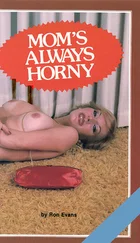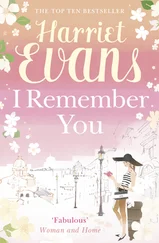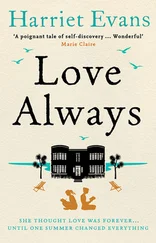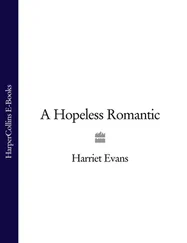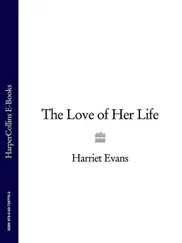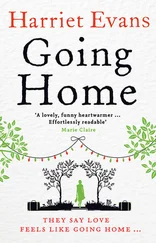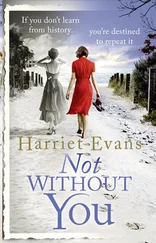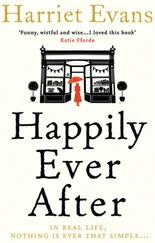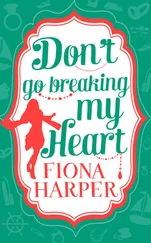Harriet Evans - Love Always
Здесь есть возможность читать онлайн «Harriet Evans - Love Always» — ознакомительный отрывок электронной книги совершенно бесплатно, а после прочтения отрывка купить полную версию. В некоторых случаях можно слушать аудио, скачать через торрент в формате fb2 и присутствует краткое содержание. Жанр: Старинная литература, на английском языке. Описание произведения, (предисловие) а так же отзывы посетителей доступны на портале библиотеки ЛибКат.
- Название:Love Always
- Автор:
- Жанр:
- Год:неизвестен
- ISBN:нет данных
- Рейтинг книги:3 / 5. Голосов: 1
-
Избранное:Добавить в избранное
- Отзывы:
-
Ваша оценка:
- 60
- 1
- 2
- 3
- 4
- 5
Love Always: краткое содержание, описание и аннотация
Предлагаем к чтению аннотацию, описание, краткое содержание или предисловие (зависит от того, что написал сам автор книги «Love Always»). Если вы не нашли необходимую информацию о книге — напишите в комментариях, мы постараемся отыскать её.
Love Always — читать онлайн ознакомительный отрывок
Ниже представлен текст книги, разбитый по страницам. Система сохранения места последней прочитанной страницы, позволяет с удобством читать онлайн бесплатно книгу «Love Always», без необходимости каждый раз заново искать на чём Вы остановились. Поставьте закладку, и сможете в любой момент перейти на страницу, на которой закончили чтение.
Интервал:
Закладка:
‘No. I don’t miss it,’ he says, to my surprise. ‘I am very happy here in most ways. As I say, the porridge, the cereal – these are things which need to be satisfactorily addressed . . .’ He trails off. ‘But up here –’ he taps his head – ‘I have everything I need up here. Have you heard of a memory palace?’
‘Sort of,’ I say. ‘You train your brain to remember things.’
‘That is almost it,’ he says. He closes his eyes. ‘You build a palace of memories. Each room in Summercove is in my head, fil ed with things I want to hold on to. I am not in the house any more. It is in me.
‘That’s al I need. My old pupils write to me, I read books – thank God my eyesight is stil good. I have my memories.’ He gently closes the photo album. ‘I can picture my bedroom in Lahore. I can see the Shalimar Gardens.’ He is staring out to sea. ‘The boat I took, from India to England, seventy years ago. I can remember my cabin. It had a stripe, painted green, across the wal . I remember the books I had on my trip, can see them on that little shelf, by the porthole – Boethius, John Ruskin and Bertrand Russel you know, excel ent fel ow. And I remember Cecily. So.’ He puts his hands together. ‘Last time I saw you, I gave you the first pages of my daughter’s diary. Tel me, did you find the rest of it, hm? Did you read it?’
I don’t know how to answer. ‘Yes – yes,’ I say, as if admitting to something shameful. ‘Mum had it.’
He nods. ‘I thought as much. I found the pages in my room, you see, after she’d taken me into the studio.’ He coughs, spluttering a little. ‘I thought she must have spotted it while we were in there. Put it away for herself. Dropped the first pages, not realised.’ He stops. ‘Yes, so she has it.’
‘I’m – sorry about al of it, Arvind.’ I don’t know what to say. ‘It must be awful – awful for you.’
‘I haven’t read it,’ he says simply. I flinch with surprise. ‘What?’
‘I know what’s in it,’ he says. He smiles. ‘Perhaps I don’t want to read it. Sometimes it’s best to shut out the real world, you see.’ He taps his forehead again gently. ‘In the memory palace, I can choose what rooms to go into, you see.’
My mother cal s out to us from the doorway. ‘Ready?’ she says, shattering the peace of the room. I turn, and her eyes are red.
‘Ah.’ I push Arvind in his wheelchair towards the door. He waves a polite goodbye to his motionless fel ow-residents. ‘The outsiders are outside. And it is written. Time for us to go back to Summercove once more.’
Chapter Forty-Four
Granny loved spring. She said spring made her happy. She hated autumn most of al , couldn’t ever understand why people found it poetic and romantic. She said it was depressing, the sign that life was over. Spring, she always said, was why we stuck around, to see that life had survived during the long winter months. As we turn into the little lane that leads to Summercove and then on to the sea, I can see why. The branches are bursting with bright green new life. White apple blossom blooms in the orchard next to the house.
I think of her, starting another spring here, year after year, and then watching the summer fade away into autumn, the long winter nights, with nothing to do, nothing to occupy her, Arvind in his study, her studio locked away, only memories of what she did, what happened, and I start to understand a little better.
We rol almost silently down the lane in Archie’s gleaming silver and red 4x4, so appropriate for Ealing, so out of place here, where it actual y helps on the narrow, sometimes treacherous roads. He turns the engine off and he, Mum and I look nervously up at the house, as if expecting some sign. Arvind is stil staring straight ahead.
‘They’ve done a good job, Didier’s gang,’ Archie says to Mum, in the seat next to me. ‘Hope you’l think so. I think so.’ Why does he always want her approval? She nods.
‘Good. I hope there isn’t too much mess. You told him it goes on the market on Monday, didn’t you? They have to have al their shit cleared out of here by then.’
Archie nods, and I realise how glad they wil be to see the back of the place, in some respects. How sad that is. ‘Agent says it’l go real y fast,’
he says. ‘We spoke a lot while you were away. He says the price is absolutely realistic. And we should have some . . . left over.’
‘Real y?’ Mum says, as if she’s only vaguely interested, but I see her hands tightening in her lap, clutching the sheaf of notes for her speech.
‘Oh, yeah.’ Archie pul s the keys out of the ignition and turns to his father, as if remembering he’s there. ‘Come on, Father. We’re here now.
Let’s go inside.’
It’s Arvind’s bloody house, I want to say to them. He’s stil here! Stop acting like that money’s yours. I want to knock their heads together, and then I think, He doesn’t care. He doesn’t care and that’s always been part of the problem.
It is strange to stand outside Summercove, looking up at the windows, with the memory of Cecily’s diary stil so clear. It hasn’t changed much in al those years, either, it’s not that kind of house, and so it is easy to imagine her, sitting at our room at the top, peering out of the window, dancing across the lawn towards the gazebo which stands at the edge of the garden, leaning against that wal there to have her picture taken. I clutch my bag, with the diary in it. It is now cloudy and the wind is stil vicious, whipping itself against my hands and face.
We go inside, Archie pushing Arvind. The reception starts soonish. There are people already here, chattering, a few out in the garden, looking out to sea, sitting in the gazebo, enjoying the beautiful weather. I can hear Louisa in the kitchen, directing the caterers. We go into the long, bright sitting room, and I breathe in sharply.
It is not Summercove, the home I loved more than any other. That place is gone. It’s as if it never existed.
Everything has changed. Gone are the comfy sofas, worn-out chintz armchairs, the fireguard. Gone are the shelves lined with books on art, travel, photography, the battered old TV in the corner. Gone are the original fifties wooden sideboards, the bright curtains and cushions that were so in vogue when they bought the house which have lasted, most of them, al these years. Al gone, the contents of the ground floor either moved upstairs for today or taken away to the local auction house or up to London.
The curtain rail, even, has been unscrewed. The French windows, where Jay and I would sit on rainy days betting on raindrops racing down the glass, are closed and the cushions on the window seats removed. The room is white, devoid of any furniture apart from dining chairs placed strategical y around it, and Granny’s paintings.
They line the wal s of the big room, fifteen or so, and below some of them are sketches. Above the fireplace is ‘Summercove at Sunset, 1963’, and I stare at it, having never seen it in the flesh before.
‘Where did they find this?’ I ask. ‘It was in her studio,’ Archie replies. ‘She never showed it to anyone. That, and – this was there too.’ He points, and I swivel round. Next to the door, almost hidden in its shadow, is an oil painting of a girl, a girl I know very wel now.
‘Cecily Frowning, 1963’
It’s the painting. I wonder whether Arvind stil has the sketch. I hope so. She is sitting on a stool, watching the painter, her expression watchful yet slightly cross. She is wearing a pale blue cotton sundress, which sets off her dark hair and skin beautiful y. One leg is tucked under the other, one hand holding the heel. She looks rather bored. I stand stil and stare at it.
‘My God,’ I say. ‘That’s – it.’
Читать дальшеИнтервал:
Закладка:
Похожие книги на «Love Always»
Представляем Вашему вниманию похожие книги на «Love Always» списком для выбора. Мы отобрали схожую по названию и смыслу литературу в надежде предоставить читателям больше вариантов отыскать новые, интересные, ещё непрочитанные произведения.
Обсуждение, отзывы о книге «Love Always» и просто собственные мнения читателей. Оставьте ваши комментарии, напишите, что Вы думаете о произведении, его смысле или главных героях. Укажите что конкретно понравилось, а что нет, и почему Вы так считаете.


